Oct 5, 2024
Neelam
Chhiber
Neelam Chhiber, who credits her achievements to a supportive family and education from the National Institute of Design, has dedicated over 40 years to community work in India’s creative production sector, particularly linking it to farming communities. Her organization, Industree Foundation, aims to create job opportunities for India’s workforce in the arts and agriculture using a blended finance model, positively impacting livelihoods by providing access to larger markets and resources. They are shaping the economic and social transformation of India’s most vulnerable women by curating for Climate, Equity, and Gender. They have impacted 600,000 lives, generating opportunities worth $59.7M.
One Line Life Lessons from Neelam
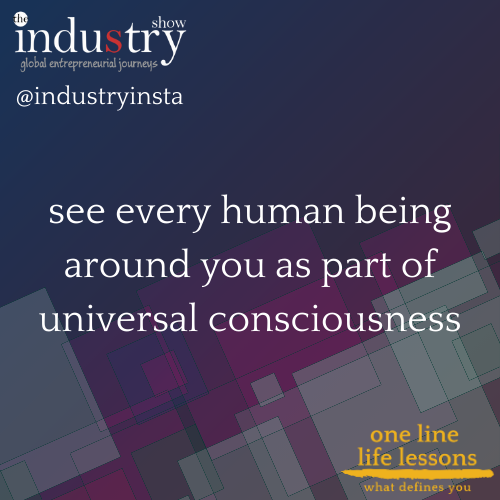
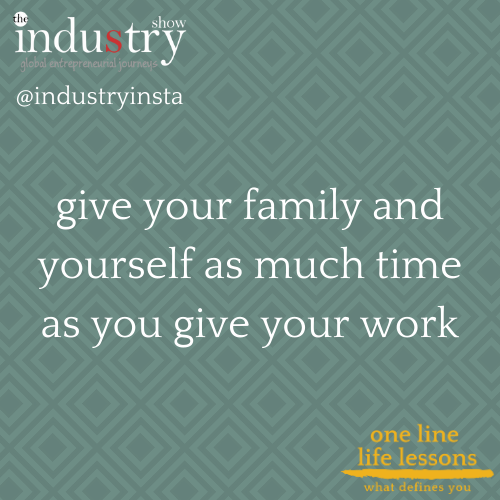
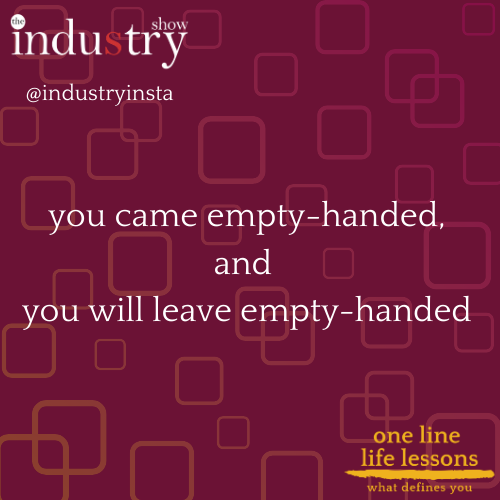
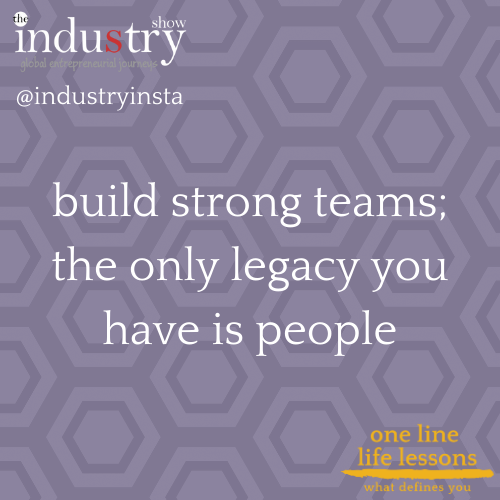
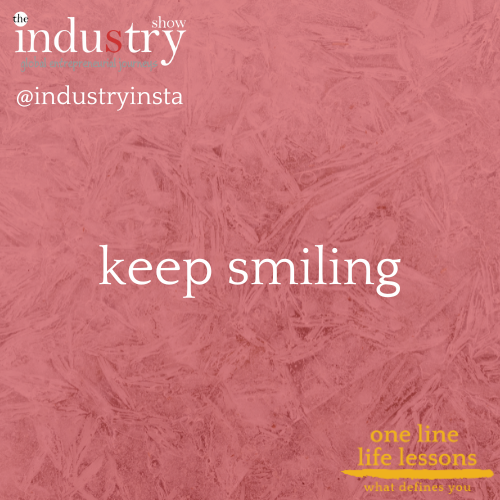
Episode Highlights
- 0:00 – Neelam Chhiber reflects on her 40+ years of dedication to community work, highlighting the influence of her supportive family and education from the National Institute of Design.
- 1:15 – Discussion on Neelam’s organization’s mission to link creative production with farming communities to create job opportunities in arts and agriculture.
- 2:30 – Explanation of the blended finance model utilized by her organization to improve livelihoods and provide access to larger markets and resources.
- 3:45 – Neelam addresses the challenge of effectively scaling social impact while avoiding the overstating of results.
- 4:50 – The initiative has positively affected 600,000 individuals, with a particular emphasis on increased incomes among women who invest in health, nutrition, and education.
- 6:00 – Overview of operations across 14 states and partnerships with the government through the National Rural Livelihoods Mission.
- 7:20 – Introduction of the program targeting one million women to earn an additional income of 100,000 rupees annually, aimed at enhancing financial stability.
- 8:30 – Neelam discusses sustainable practices like bamboo planting, contributing to long-term income and carbon sequestration.
- 9:45 – Emphasis on the role of women in family welfare and the future of children, while navigating the complexities of scaling operations.
- 11:00 – Introduction of the “6 C’s” framework to guide their efforts and promote traceable supply chains in collaboration with the Indian government.
- 12:15 – Neelam shares her long-term vision of shifting from addressing challenges to embracing opportunities over a 5 to 20-year journey.
- 13:30 – She reveals her newfound enjoyment in Korean romantic dramas and contemporary journalism, alongside her appreciation for profound texts like the Yoga Vasishta and the Bhagavad Gita.
- 15:00 – Neelam reflects on life lessons learned through perseverance, the importance of family balance, and understanding life’s transient nature.
- 16:30 – Advocacy for building strong teams as a legacy and fostering compassion through the recognition of universal consciousness, emphasizing the value of sharing wisdom within the community.
Show Transcript
Transcript - Full Episode
[00:00:00 – 00:00:08] Nitin Bajaj
Hey, everyone. Welcome to the industry show. I’m your host, Nitin Bajaj. And joining me today is Neelam Chhiber. Neelam, welcome on the show.
[00:00:08 – 00:00:11] Neelam Chhiber
Hey. Nice to be here, Nitin. Thanks so much for having me on the show.
[00:00:12 – 00:00:15] Nitin Bajaj
Pleasure is all ours. So let’s start with who is Neelam.
[00:00:16 – 00:01:11] Neelam Chhiber
Yeah. Neelam is a product of a very secure upbringing, a wonderful mother and father, which really allowed me the ability to take a lot of risks, a wonderful husband, children, in laws. So that’s really who make me who I am. Plus, I think being born with a certain inbuilt sense of mission. A lot of people have asked me where my sense of mission came from. I think this is something we carry from past lives. I frankly believe in that. And, of course, going forward, my education, I’m a designer. I was just telling someone yesterday I got the world’s best design education at National Institute of Design. And that really taught us how to problem solve and how to look for solutions. And, therefore, there’s huge learning and growth from the communities we worked with on the ground who’ve always given us much more than we could ever give them. So that’s what makes Neelam. Yeah.
[00:01:12 – 00:01:39] Nitin Bajaj
So true. And having known you for a bit, I think there’s a big dose of humility mixed into all of that. So thank you for being you. Thank you for your passion, for the causes you help serve. And would love to have you tell us what Industree Foundation is, why you started it, and a little bit about the impact you and your team have been able to create for our community.
[00:01:40 – 00:01:48] Neelam Chhiber
Yep. So Industree as the name says, it’s the tree of Indus. It’s the tree of life. Yeah. You know the name well.
[00:01:48 – 00:01:48] Nitin Bajaj
Yes.
[00:01:49 – 00:02:46] Neelam Chhiber
Yeah. Since you have the URL in the US for it. So we think alike in that way at least. And, yeah, we started my work started 40 years ago, but I think as an entity, we started 30 years ago. And we’ve built a blended finance model because we’ve realized that when we want to serve communities on the ground, which is basically India’s largest workforce in the artist handle sector, which I call the creative production sector. And it’s all it’s linked to farm communities because, historically, our farm communities always did nonfarm work. They never just depended on that one single monsoon. So now we work in farm and off farm sectors, and, our whole job is about how do we create opportunity for 200,000,000 of these people. Yeah. India has the world’s largest smallholder farming community and the world’s largest living creative production workforce.
[00:02:47 – 00:02:47] Nitin Bajaj
Mhmm.
[00:02:48 – 00:02:58] Neelam Chhiber
So we work with these communities. And as a designer, I got into this to build solutions, And basically, that’s what Industree does. Yeah. Yeah.
[00:02:58 – 00:03:36] Nitin Bajaj
It’s been a while, several decades of, pure passion that has gone into this. And you’ve touched several lives in a positive way, and you’ve helped expand and bring not just livelihood, but a lot of in the process. Because for a lot of them, this is their livelihood and they’re not making enough in most cases. But with this, with Industree, you’ve been able to give them much bigger markets and access to things that they did not have before. So thank you for doing all of that. I’d love to hear from you in solving other people’s challenges. What is the one big challenge you face?
[00:03:37 – 00:05:10] Neelam Chhiber
Frankly, the 40 years of this where we’ve had to look for models that can exponentially scale Mhmm. Because we cannot talk about a 100,000 people or there are 200,000,000 people out there, right Yes. That we really need to touch. Mhmm. So the biggest challenge has been finding how exponential scale can happen in a very true and real way without just throwing out numbers. The numbers say that we’ve impacted 600,000 lives. Right? We have ensured that the communities we work with, the incomes have gone up at least 3 times. Right? We work with women because once you work with women, you can ensure that the money that’s increasing goes towards health, nutrition, education of the next generation. We today are working in 14 states in the country, and we have reached a point after facing the biggest challenge, which was how to do exponential scale, which we solve by saying that we just need to work with the government of India. So now the 14 states that we are going into, we’re going in with the National Rural Livelihoods mission, working with 14 state rural livelihoods missions. And the challenge will continue because it’s not gonna be easy to ensure that government programs work the way we have had all these years, but we’ll have to make that happen because there’s no other way exponential scale can take off in this country.
[00:05:11 – 00:05:29] Nitin Bajaj
So true. That’s a massive challenge, but then I can only think of one person to take that on, and I’m glad you’re at the helm of this. Now with challenges come opportunities, and, of course, you’re no stranger to them. I would love for you to highlight what is the one that’s most exciting.
[00:05:30 – 00:06:06] Neelam Chhiber
Yeah. I’ve spoken about this program, which is called the 1,000,000 lakpati. So it’s very important when we work with the government that we start speaking the language of the government, which we do now. So this is basically a 1000000 women who will be unable to earn a lakh annually at the minimum, and it’s an additional income. Mhmm. Because we don’t go into communities, and we don’t oosap whatever they’re doing. Yeah. They continue doing whatever they’re doing. They have their incomes. It’s about enabling a 100100000 rupees of additional income, which in dollar terms is something that my brain may not immediately $1200.
[00:06:06 – 00:06:08] Nitin Bajaj
Yep.
[00:06:08 – 00:06:56] Neelam Chhiber
Yeah. It’s an additional $1200 annually. Mhmm. We all know that the maximum population in the world who lives in on less than $5 a day is in India. It still is in India, the maximum size of population in the world. So adding $1200 annually is a substantial sum to their existing incomes, which could already be maybe so that’s what is the biggest opportunity ahead of us that we work in these 14 states. We enable them to plant bamboo, which gives them regular income for the next 40 years, and they also become eco communities, meaning they are improving carbon sequestration on the planet. Bamboo is the world’s highest and fastest sequestering plant.
[00:06:56 – 00:06:56] Nitin Bajaj
Yes.
[00:06:56 – 00:07:16] Neelam Chhiber
So really enabling what we’ve dreamt of for 40 years. This huge opportunity is around building equity because these are all women’s collectives that they co own and they lead climate. So it’s all about carbon sequestration and gender. ECG, we call it equity, climate, gender. Yeah.
[00:07:17 – 00:08:44] Nitin Bajaj
Love that. And just to dig up on this a little bit more, $1200. And as you rightly pointed out a few minutes earlier, that money is not going into spending. It’s going into helping raise a family, the next generation. Because I believe in and you will know this better than I do that when a female earns and brings in the income, it spreads and impacts and touches the entire family. And that we’ve seen to help an entire generation. And the children then can go to school, have confidence, have the right kind of health care and nutrition and many other things. So love the program. Congratulations on that. And I know it’s a lot of work ahead of you and the team, but, again, I’m so happy and glad that it’s your team that this is taking this on. Now as we look forward with this with this opportunity, I wanna take a moment and step back in the rear view mirror and look at 2 instances in, your previous life and career. One where things did not work out as you had expected. There was failure. There were lessons. And another one that, blew your expectations and became a success beyond your imagination.
[00:08:46 – 00:09:58] Neelam Chhiber
Yeah. So they’re completely interlinked. They’re completely interlinked because it’s obviously, it’s from your biggest mistakes that you will choose the the best opportunity. We are lovers of the artisanal sector. We are the largest voice in the country, the strongest voice in the country for creative production. But taking creative production to exponential scale is immensely difficult. We have something called the 6 c framework, where all the 6 c’s need to operate in a very synchronized way. Yeah? Channel, capital, create, capacity, construct, connect, which is a digital platform. And everything it’s a very synchronized activity because you are providing product to global customers like IKEA or or to very large brands like Louis Vuitton or whatever it is. Right? Or to niche markets large retail markets in India. So we’re moving communities from local hearts and just exhibitions to really organize supply chains. So we’ve done that, but it’s enormously complicated to take that to exponential scale.
[00:09:58 – 00:09:58] Nitin Bajaj
Mhmm.
[00:09:58 – 00:11:53] Neelam Chhiber
So from that learning, it’s been an amazing journey. That 40 year learning over the last 4 years, we’ve distilled that learning and looked at the plantation sector and said that with the government of India, let’s not start with creative production. Let’s go backwards in the value chain. Let’s talk about traceable supply chain and start with plantation of raw material. Because, frankly, whenever we talk to global customers, they say you believe in equity, climate, gender, but we believe in traceable supply chain. That’s the future. Right? Because with EU, US has given a kick to ESG. But for how long? 10 years? 15 years? Can’t be for very long. Right? But Europe is still marching ahead very strongly with traceable supply chains. Right? So we are building supply chains of the future, and we are starting with plantation and moving to the farm sector, but using all our principles of nonfarm. Right? And like I said, I wouldn’t call it a failure, but, yes, we’ve put that on hold. We’ve said with the government of India, we’ll do a plantation for 5 years with a 1000000 women, put it all on a digital platform, all the methodologies, and then we will take it, and we’ll start pushing out the value addition aspect, right, the creative production aspect. And, frankly, you’ve got to do this value chain by value chain. There is a limit to how much you’re going to do this generically because it really needs to impact the communities. So we are hoping. It’s like I tell everyone. It’s the next 5 to 20 year journey. It’s not something that’s been cracked. So we are giving our creative production opportunity and looking forward to really touching that 5 years from now. Again, revisiting it. Mhmm. That’s so like I said, they’re both completely interlinked. Yeah. We made the challenge into an opportunity.
[00:11:54 – 00:12:35] Nitin Bajaj
Yeah. And that’s amazing. Both at the scale at which you’re doing, this is a massive undertaking, but it also shows that you’re doing this for the right reasons. You could have continued doing what you’re doing and continue to make positive impact, but you see an opportunity here to just shift gears and make a much, much bigger impact. So kudos to you for making the right but the difficult choice. Now I’d love to turn the the temper here a little bit and ask you 2 questions. 1, what do you do for fun? And, 2, if you have a book or a podcast recommendation for our audience.
[00:12:38 – 00:12:53] Neelam Chhiber
Okay. So super interesting. In the past, I would have said I do yoga. I go to I do run on the beach. That’s why I moved to Goa. Right. My son said, why do you want to move to Goa Ma? I said, I just have to go and stand on the beach, and I feel like running.
[00:12:54 – 00:12:54] Nitin Bajaj
Yeah. So
[00:12:54 – 00:13:17] Neelam Chhiber
I’m the only 62 year old woman in a swimsuit who runs on the beach for an hour. I do a very slow trot. Very slow. Let my run not sound like a run. It’s just like a speeded up walk. But these days, I have something new that I can talk about that I love doing for fun. I watch Korean drama, romantic drama. A lot of it, frankly. Would have
[00:13:17 – 00:13:18] Nitin Bajaj
never guessed that in
[00:13:19 – 00:13:36] Neelam Chhiber
Yeah. So I have something new to share. Yeah. So I proudly talk about it. And any meeting I go to, I always find out. And believe it or not, there are tons of people who love Korean drama. So that’s where I am at right now. Yeah. Hollywood is just busted. Hollywood Bollywood is gone. It’s over.
[00:13:37 – 00:13:49] Nitin Bajaj
I had heard of k pop, but this is the first time I’ve heard about Korean drama. So that’s a new thing for me. My daughters would love to hear that. I’m also not very sure they should hear this because then they will want to see
[00:13:52 – 00:15:01] Neelam Chhiber
Yeah. And on the books and podcast okay. So you know what? I stopped re I used to read heavily when I was younger. I’m a product of my reading. Right? But, I I don’t think I’ve seriously read a book for the last 20 years. I flipped through them. My husband loves books. My house is floor to ceiling with books. Let’s not talk about that. But I used I like reading smaller things. So I used to be a great fan of Granta. I used to read a lot of Granta because they shot excerpts and stories in Granta. Now you know what? I’ve discovered a wonderful replacement. Believe it or not. I read Washington Post, New York Times, and The Economist. These 3. Right? So I read there was a wonderful article in the post last week. It’s called the cannery. It’s an opinion, and I read the opinion pieces. It was phenomenally well written. It was beautiful. So, yeah, so that’s what I do. I just scroll these things. I look for something interesting to read, and that’s what I read. In terms of reading, that’s what I’ll tell you. I will not say that my 3 biggest, Bibles are today, the Yoga Vasishta, the Bhagavad Gita
[00:15:01 – 00:15:02] Nitin Bajaj
Mhmm.
[00:15:02 – 00:15:17] Neelam Chhiber
And, Ramana Maharishi’s book, be as you are. So I’m not going there. So that’s very serious reading. So that’s it. So those are the 3 books always on my desk, and I always keep flipping through them. And on the podcast you said.
[00:15:18 – 00:15:18] Nitin Bajaj
Mhmm.
[00:15:19 – 00:15:38] Neelam Chhiber
Yeah. Yeah. So I am digitally challenged. I listen to podcasts when with my sons. So I love spending time with my 30 3 year old and my 31 year old. And when they are driving, I love going on drives with them. And then they listen to podcasts, and I listen to their podcasts. So that’s where I am on podcasts. Yeah.
[00:15:39 – 00:16:17] Nitin Bajaj
I love that, one, you live vicariously through them. So their taste and and everything, you get a flare for that. 2, you have an avenue to tap into the age old wisdom that we have around us. And 3, and the most interesting thing is I know one person now that is getting something positive out of a newspaper or or the whole new cycle around us. So very cool. Now onto my favorite part of the show, we call it the one line life lessons. Would love for you to share some of your life lessons with us.
[00:16:17 – 00:18:05] Neelam Chhiber
Yep. So for this, I made a very small note, but I remember most of them. So first and foremost, I’m just a product of try and try till you succeed. That’s it. Okay? Number 1. Number 2, give your family as much time and yourself as much time as you give your work. As much as time as you could equally distribute it, please do that. Your, you came empty handed into the world. You will leave empty handed. Yeah. And ensure you spend you are at least with 1 person who’s dying in front of you in your life. It will change you because you will see a spirit leave a body and that person not taking anything with them. It’s very important to see it with your own eyes. Build strong teams. That’s the only legacy you have, the people you invest your time in. You have no other legacy, and this is my latest. It’s luckily, it’s not about Korean drama, but it’s about something that which is the it is the root of Advait. It’s it’s in Hindi, we say. Right? So in every human being around you, there is the universal consciousness. It’s helpful if you can start looking at it that way, and you will feel less anger. You will feel less pain. You will feel less hurt. So I think that’s I’ve started learning this after 60. I wish I’d learned it much earlier, so that was it. Yeah.
[00:18:06 – 00:18:44] Nitin Bajaj
Thank you for sharing the wisdom. We now thanks to you, learning it much earlier, much sooner, and hopefully some others out there even earlier than I am. Neelam, thank you again for sharing your journey and your story, your life lessons, but most importantly, for sharing your life and helping give back to the community. And I don’t even think you do that to give back. This is what you’ve done. This is what you have known, and you do it with all your passion and vigor. So thank you for being you. Really appreciate it, and had an amazing time sharing your journey with our audience.
[00:18:45 – 00:18:54] Neelam Chhiber
Thanks, Nitin. I enjoyed myself too. I love doing this once in a while because it’s really nice having a nice chat like this. Thank you so much.



